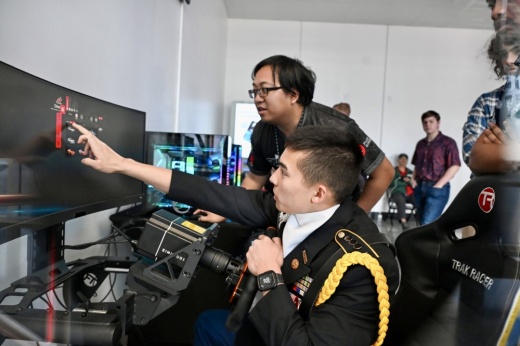This is why state legislators are eyeing San Antonio as the site for its Texas Cyber Command.
“The sleepy town of San Antonio is on the cutting edge of cyber [security],” Webster said. “And this Cyber Command is one more rock in the foundation of what we’re going to do for cyber here in this community.”
With the digitalization of major infrastructures, the need to protect computer systems, devices, networks and data is crucial. To meet this need, the local cybersecurity industry is projected to grow by 12% through 2028, according to the Greater SATX Regional Economic Partnership.
Gonzalo Parra, assistant professor of cybersecurity at the University of the Incarnate Word, said San Antonio’s prominence in the industry is built on decades of strategic development, primarily driven by its significant military and federal intelligence presence.
“Joint Base San Antonio and vital commands like the 16th Air Force and NSA Texas act as a foundational pillar for the city’s cybersecurity sector,” Parra said.
Additionally, the city has cultivated local talent through a variety of academic programs, ranging from grade school initiatives to university majors.
Joe Sánchez, creator and executive director of CyberTexas Foundation, said the city’s robust cybersecurity ecosystem began in the late ‘90s with the first program established at St. Philip’s College.
In 2001, the University of Texas at San Antonio developed its program and created the Center for Infrastructure Assurance and Security. Now, there are programs throughout the Alamo Colleges District, local state university systems and private institutions.
Measuring the impact
The average entry-level salary in San Antonio’s cybersecurity industry is $72,000, according to the Greater SATX Regional Economic Partnership.
Quotes of note
- “San Antonio has been called a poor community, but when you’re creating jobs and an economic base that now pays this kind of wages, it just changes the face of San Antonio.” - Jeff Webster, president and CEO of Greater San Antonio Chamber of Commerce.
- “[The Cyber Command] is a big win for UTSA and for the city as a whole. This is something that is going to help our country fend off cyber attacks, and to have that focus at one of our premier universities helps solidify San Antonio as one of the premier cities in the country.” - Marc Whyte, District 10 Council member
- “San Antonio's ecosystem includes a diverse range of players, from major defense contractors like Northrop Grumman and Leidos serving federal clients, to numerous locally headquartered firms such as IPSecure and Jungle Disk.” - Gonzalo Parra, assistant professor of cybersecurity at University of Incarnate Word
The conditions
Whyte said although the industry is already thriving, the state’s Cyber Command will help the city retain its talent.
“I think that having Cyber Command here in San Antonio should be a message to tech companies everywhere that San Antonio is a place [where] you can move your business, [where] you can start your business, and [where] your business can thrive,” Whyte said.
Webster said the industry offers more opportunities for residents to get access to well-paying jobs.
“I heard a story from Alamo Colleges about a young woman who came from a family with an [annual] income of $14,000, she went and got [her] certification—just an entry-level associate degree—and her household income went to $50,000,” Webster said.
School districts in San Antonio have also cultivated programs, such as North East ISD’s Institute of Cybersecurity and Innovation, which fast-tracks K-12 students into the industry.
“We’re creating a generation of future workers that are going to be vastly different from what we have today in San Antonio,” Webster said.
The big picture
Sánchez said the city is also a major player in the CyberPatriot Program—a national K-12 education program run by the Air & Space Forces Association—that holds competitions where schools compete to secure vital networks from cyberattacks.
“Of the 5,000 teams, there were 337-340 registered last year here in San Antonio. If we were a state, we would only be behind California and Texas,” Sánchez said.
CyberTexas Foundation also partners with consulting firm Booz|Allen|Hamilton to provide seniors on CyberPatriot Teams internships where they can work on federal projects.
In Gov. Greg Abbott’s February State of the State address, he said establishing a Cyber Command in Texas was a priority of this year’s legislative session. Known as House Bill 150, the command center passed in a 130-13 vote in the Texas House of Representatives on April 16. The bill is currently making its way to the Senate for its approval, as of press time.
Located at UTSA’s downtown campus, the new command center would strengthen the state’s operational defenses.
Additionally, Sánchez said the new Texas Cyber Command will offer its services to private entities that manage critical infrastructure, such as water and power companies.
“I’m very certain that any of those that do conduct critical infrastructures will be looking to at least share information with Texas Cyber Command to make sure that we have a good sense of what’s going on across our state,” Sánchez said.

Looking ahead
If the bill passes through the Senate, it would go into effect and formally establish the Texas Cyber Command on or before Sept. 1.
The center is estimated to cost roughly $413.85 million through 2030.






